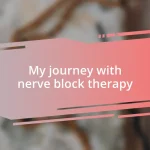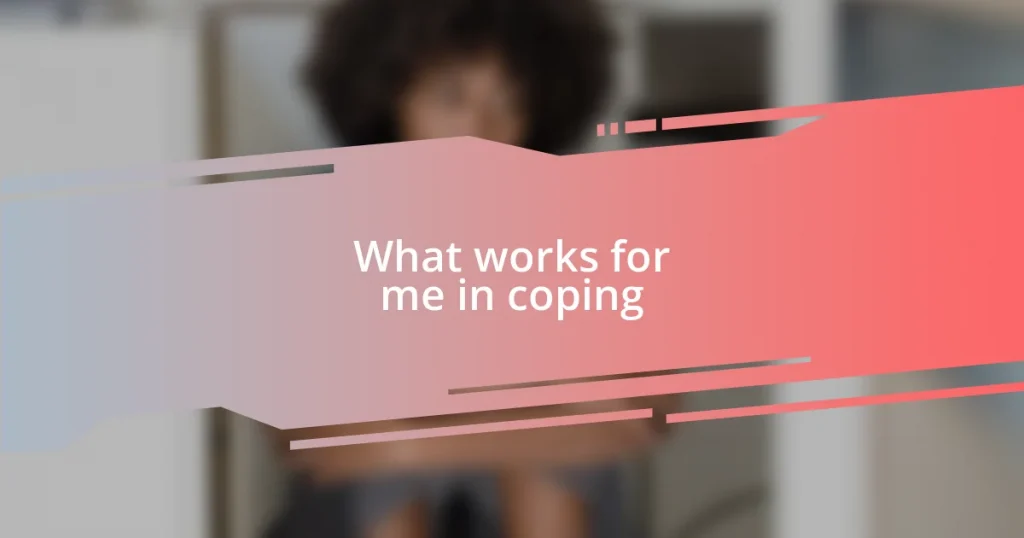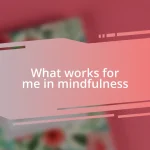Key takeaways:
- Coping mechanisms can be problem-focused or emotion-focused; recognizing personal triggers and experimenting with strategies significantly enhances stress management.
- Building a supportive social network and nurturing relationships fosters emotional resilience, highlighting the importance of mutual support in friendships.
- Evaluating and adjusting coping methods over time ensures ongoing effectiveness and adaptability to new challenges, promoting sustained well-being.
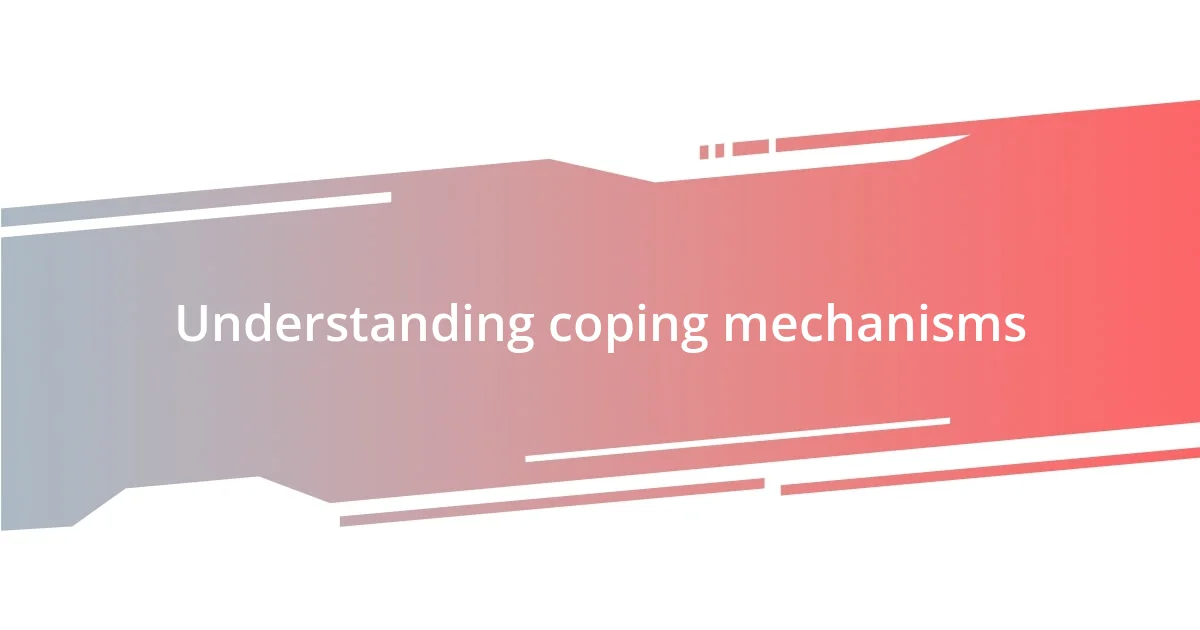
Understanding coping mechanisms
Coping mechanisms are the strategies we develop to help us deal with stress and emotional pain. I remember a time when I felt overwhelmed by work and personal responsibilities. Instead of reaching for comfort food, I decided to take a long walk in nature, which reminded me how powerful simple changes can be in reshaping our mental space.
These mechanisms can be broadly categorized into problem-focused and emotion-focused strategies. For instance, when I faced a tough situation, like preparing for a crucial presentation, I learned to break it down into smaller, manageable tasks. It raised the question: why struggle alone when seeking support can lighten the load? Looking back, I realize that discussing my worries with friends not only eased my anxiety but often led to valuable advice.
It’s essential to recognize that what works for one person might not work for another. There was a phase in my life when journaling became an invaluable outlet. Each entry was like a step toward clearer understanding; I found that articulating my feelings on paper unburdened my mind. This leads me to wonder, how have your experiences shaped the coping strategies you rely on?
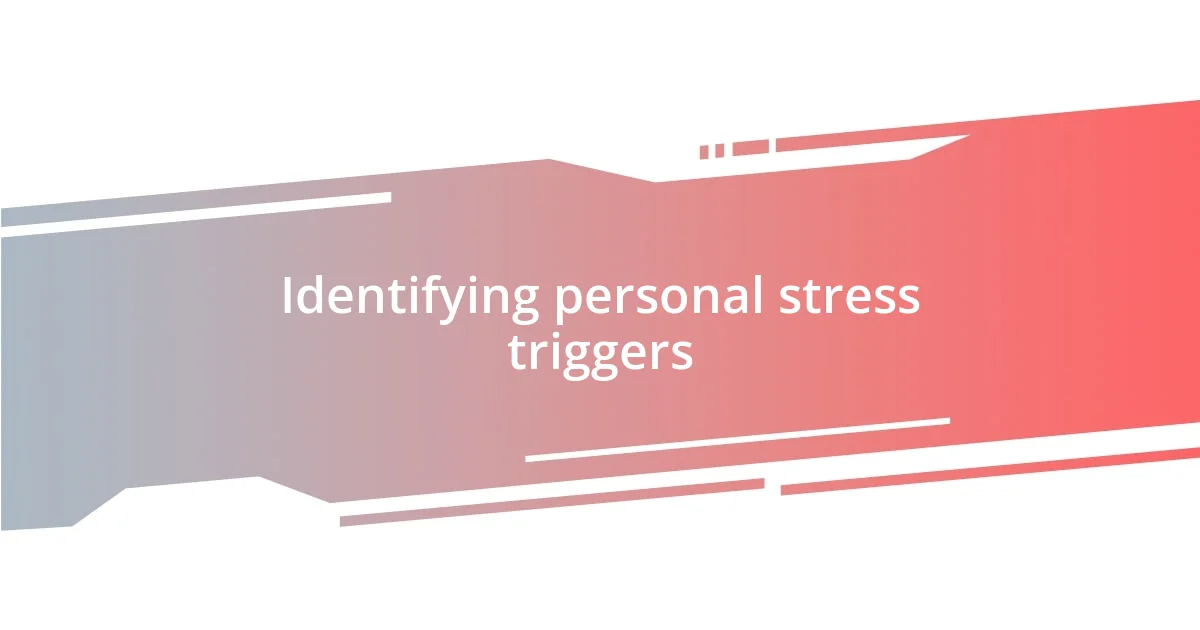
Identifying personal stress triggers
Identifying personal stress triggers is crucial for effectively managing stress. I vividly remember a time when I was caught off guard by a sudden spike in anxiety. It took some reflection to realize that loud environments, like crowded cafes, often left me feeling drained. Recognizing this pattern has since helped me make conscious choices about where I spend my time.
Another aspect to consider is how different situations can elicit various emotional responses. For example, during a particularly busy period at work, I noticed that unexpected requests from colleagues triggered my stress. This awareness prompted me to set boundaries and communicate more openly about my limitations, resulting in a calmer work environment. Isn’t it fascinating how understanding our triggers can be liberating?
Finally, I’ve discovered that maintaining a stress journal can provide profound insights into my triggers. Reflecting on my day and noting what contributed to stress has clarified patterns I wouldn’t have otherwise recognized. Just last week, I wrote about feeling overwhelmed during family gatherings; it prompted me to plan smaller, more manageable meet-ups. How about you? Have you ever identified your stress triggers through intentional reflection?
| Stress Trigger | Response |
|---|---|
| Loud Environments | Feel Drained |
| Unexpected Requests | Heightened Anxiety |
| Family Gatherings | Overwhelm |
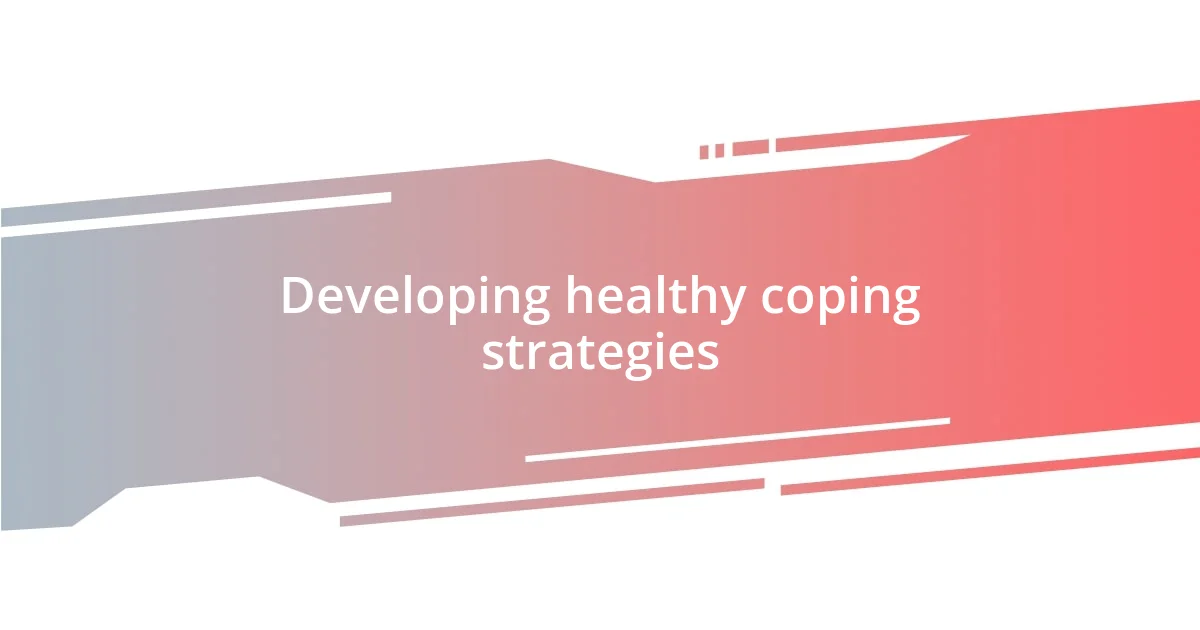
Developing healthy coping strategies
Developing healthy coping strategies requires a blend of self-awareness and proactive measures. I remember a time when my stress levels peaked, and I instinctively turned to deep-breathing exercises. It felt like a reset button for my mind, allowing me to regain clarity amidst chaos. Experimenting with different techniques can reveal surprising tools that resonate with you, guiding you toward healthier responses to stress.
Here are some strategies I’ve found effective in my journey:
- Mindfulness Meditation: Just five minutes can transform my day. Focusing on my breath helps me stay grounded.
- Physical Activity: Whether it’s a jog or a dance class, moving my body lifts my spirits and clears my head.
- Creative Outlets: When I engage in painting or writing, it’s a cathartic experience that helps me process emotions.
- Social Connections: Calling a friend or family member to share my thoughts can lighten burdens and often spark laughter.
- Establishing Routines: Having a structured schedule provides predictability, which can be reassuring in uncertain times.
Sometimes, I’ve found myself tangled in a web of stress, only to realize that dedicating a few moments to a hobby made all the difference. It’s these little joys that can subtly shift our mindset when it feels like everything is spiraling. What strategies have you found that uniquely help you cope?
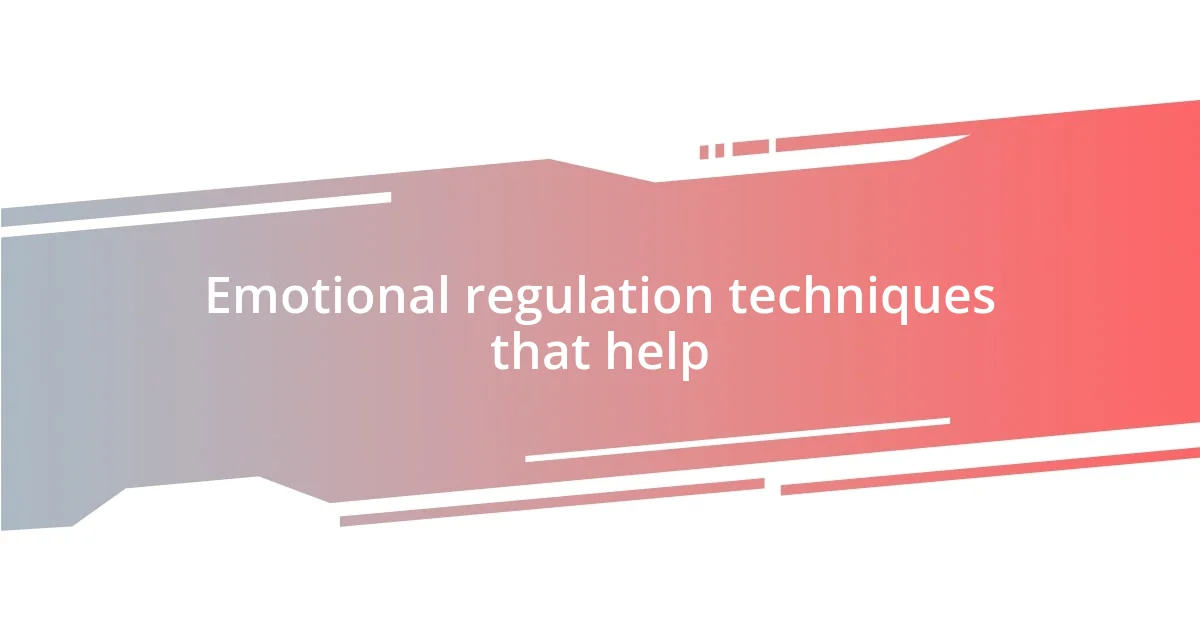
Emotional regulation techniques that help
Emotional regulation can be a powerful tool in navigating life’s challenges. One technique that has always resonated with me is the practice of “grounding.” I remember feeling overwhelmed during a particularly stressful week, and grounding techniques, like focusing on my senses—what I could see, hear, and feel—helped pull me out of that anxious spiral. It’s amazing how connecting with the present moment can provide a sense of calm. Have you ever tried to ground yourself in a moment of turmoil?
Another method I find incredibly effective is practicing self-compassion. There was a time when I was overly critical of myself after a mistake at work; it fueled my anxiety and shame. By consciously switching my internal dialogue to one of kindness and understanding, I transformed that experience into a learning opportunity. Approaching my emotions with gentleness has made a significant difference in how I cope with stress. Could treating ourselves as we would a close friend change our emotional landscape?
Lastly, I often utilize visualization techniques when my emotions start to feel particularly intense. Picture this: I’m in the middle of a chaotic day, and I close my eyes to envision a serene beach. The sound of waves washes over me, and I can almost feel the warmth of the sun on my skin. This momentary escape through visualization serves as a reset, allowing me to return to my tasks with renewed energy. Have you ever imagined a safe space to help ease your mind during stressful times?
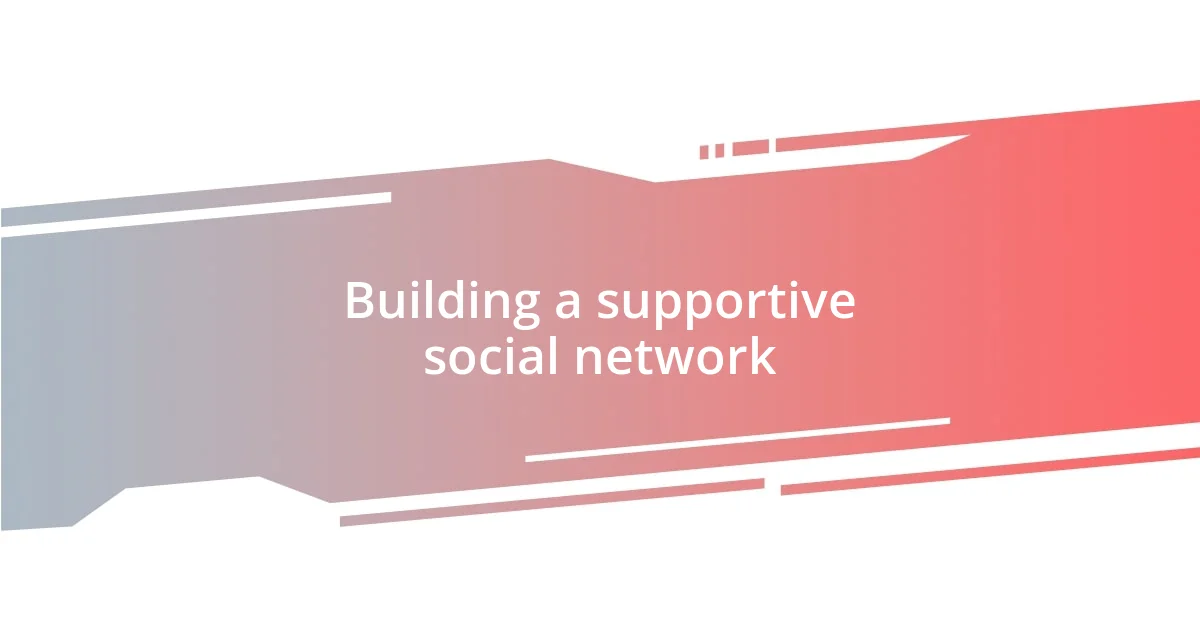
Building a supportive social network
Building a supportive social network has been a game-changer for me in coping with life’s ups and downs. I recall the days when I hesitated to reach out, thinking I’d burden others with my struggles. However, I soon realized that sharing my thoughts often sparked connections I didn’t expect. Have you ever found that a simple conversation with a friend lifted your spirits? It’s fascinating how vulnerability can lead to greater intimacy and mutual support.
Nurturing my relationships has taught me the importance of surrounding myself with uplifting people. For instance, I once joined a local book club, not just for my love of reading, but to meet new friends who shared similar interests. The laughter, discussions, and diverse perspectives have enriched my life in ways I never anticipated. What I’ve learned is that creating shared experiences, no matter how small, can strengthen bonds and provide emotional fuel when I need it most.
I’ve also discovered that it’s essential to invest time in relationships that feel reciprocal. During a particularly rough patch, I reached out to an old friend, only to find that our conversations naturally balanced between sharing burdens and joy. This give-and-take dynamic became a lifeline for me, reinforcing the idea that a solid social network thrives on mutual support. Have you ever considered the balance in your friendships? It’s empowering to realize that building a network involves both leaning on others and extending a hand when they need it, creating a rich tapestry of support.
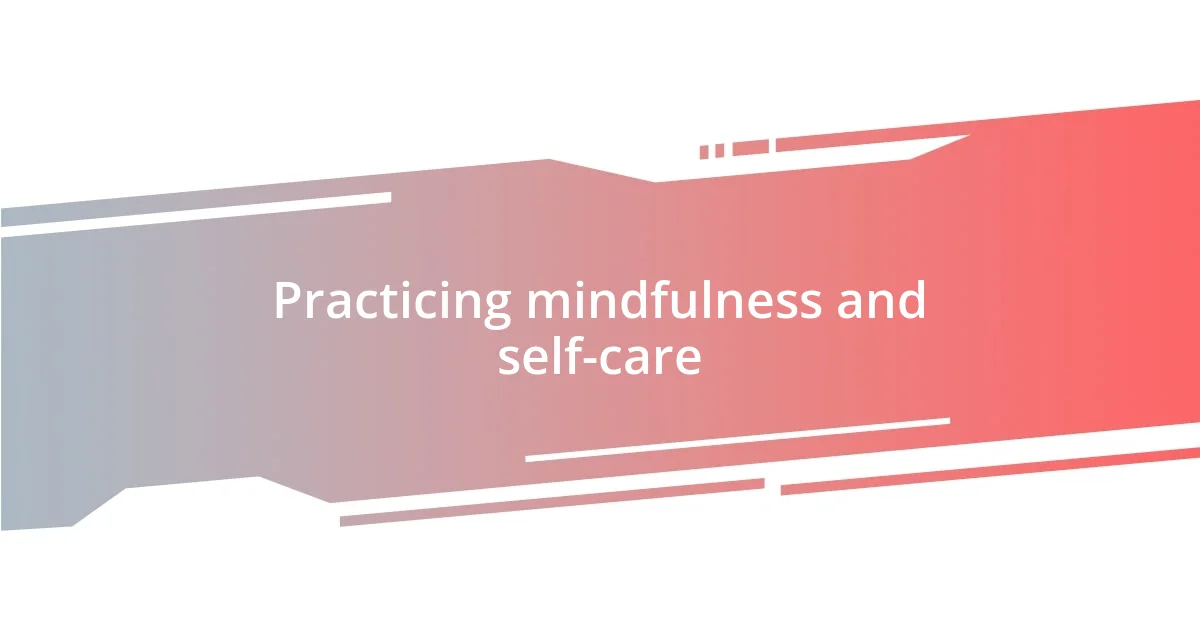
Practicing mindfulness and self-care
Practicing mindfulness and self-care has become essential in my daily routine, markedly improving my overall well-being. For example, I carve out a few quiet moments each morning to sip my coffee in solitude, focusing on its rich aroma and warmth. This simple act of being present helps me set a positive tone for the day—hasn’t a mindful sip ever made you appreciate the little things?
I recall a time when I felt overwhelmed by daily pressures, so I decided to incorporate short meditation sessions into my evenings. Sitting in a comfortable spot, I would concentrate on my breath and allow my thoughts to drift away, creating a space for peace. This intentional break reset my mind and allowed me to approach my challenges with clarity. Have you ever experienced the transformation that comes from just a few moments of quiet reflection?
One self-care practice that truly resonates with me is journaling. I remember feeling weighed down by my emotions during a busy work week, and writing helped me pour those feelings onto the page. Not only did it provide an outlet for my thoughts, but it also revealed patterns I hadn’t noticed before. This process of self-discovery reminds me of the significance of listening to myself—how often do we neglect our inner voice in the hustle of life?
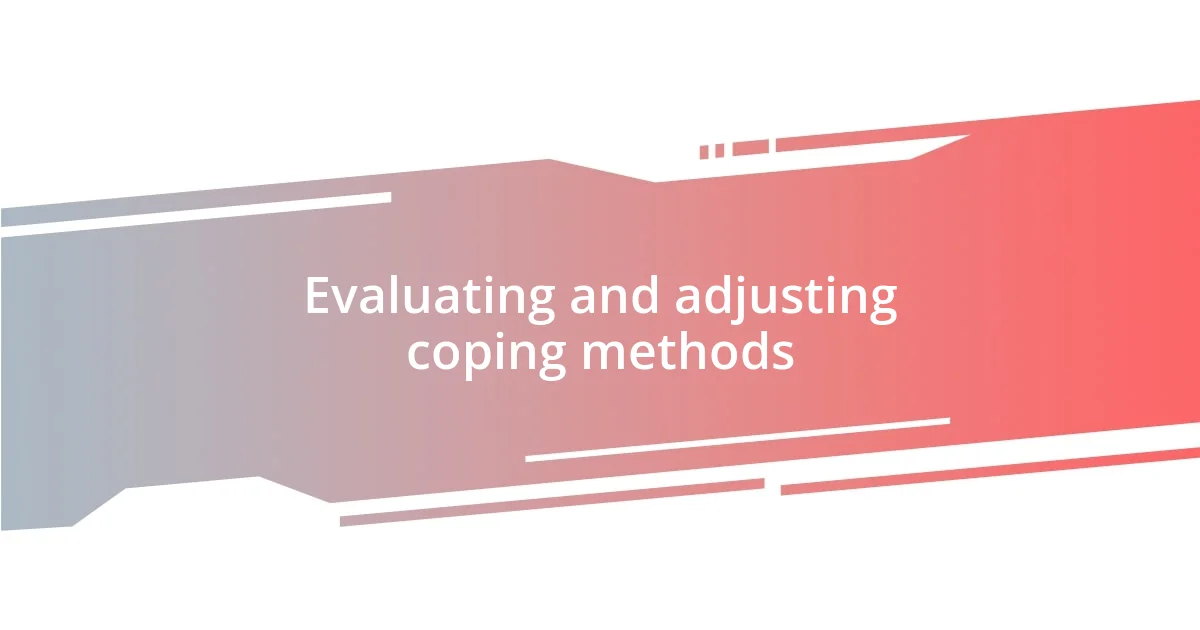
Evaluating and adjusting coping methods
Evaluating my coping methods is an ongoing process that I embrace wholeheartedly. Not long ago, I realized that the techniques I relied on during one of my life’s tougher phases had become stale. Have you ever found yourself going through the motions, only to discover that what once worked no longer resonates? I started journaling again to assess which strategies provided comfort, and it surprised me how uncovering those feelings reignited my self-awareness.
Adjusting my coping methods isn’t just about identifying effective tools; it’s also about recognizing when to let go of those that no longer serve me. For example, I used to believe that exercising every morning was the ultimate answer to stress. After a few weeks, however, I found myself dreading those early wake-ups. By shifting to evening walks, I discovered a refreshing alternative that allows me to reflect on my day instead. Have you ever considered how a simple tweak to your routine could alleviate pressure?
I’ve learned to embrace flexibility in my coping strategies, allowing me to adapt to various challenges. Sometimes, I find comfort in immersing myself in creative activities like painting or cooking when stress levels rise. It’s astonishing how shifting focus from the source of stress to a creative outlet can not only provide release but also bring joy. Have you experimented with different coping techniques to discover what feels right for you? This journey of evaluation and adjustment is essential for sustaining well-being over time.








